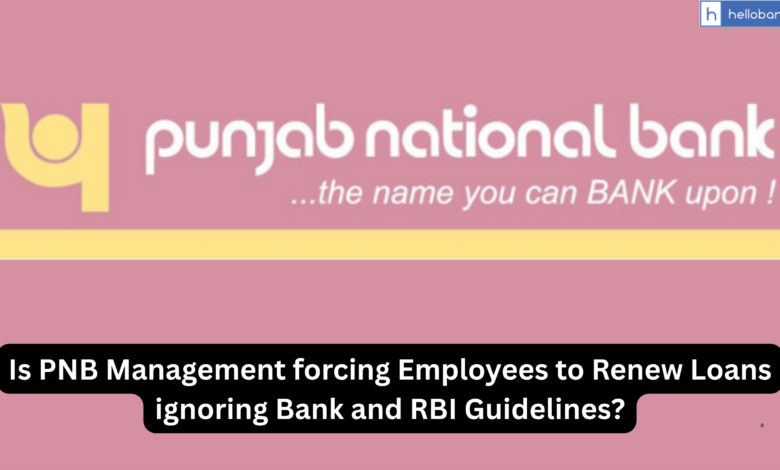Is PNB Management forcing Employees to Renew Loans ignoring Bank and RBI Guidelines?

Several PNB Bank Employees have reported that the management is forcing them to renew Cash Credit (CC) Loans without following Bank and RBI Guidelines. If this is true, then it’s really a matter of concern. On checking further, we found a letter from PNB Officers’ Association regarding forceful renewal of CC Loans. AIPNBOA has also written a letter to MD&CEO of Punjab National Bank to look into this and take appropriate steps.
What Union Said?
Most of the circle and zonal authorities are verbally pressurising branches, MCC & PLP officials to renew the cash credit limits within 15 days of its due date ignoring time line given by RBI and provision for review as per bank guidelines, which is forcing the officers to get the accounts renewed without having any supporting documents which shall result into accountability in future date. Day end check is used as one of the tools to force the officers to do the arbitrary renewal.
We have taken up this issue with our MD & CEO vide letter dated 04.06.2025. The excerpts of the letter are reproduced for the information of our members. We advise our members to follow all the rules of the bank and not to resort to short cuts under pressure.
EXCERPTS OF LETTER DATED 04.06.2025 TO MD & CEO
It has come to our notice that field functionaries are being verbally instructed to compulsorily complete the renewal of Cash Credit (Hypothecation) facilities within just 15 days of the due date, irrespective of whether the financial statements and other requisite documents required for renewal of cash credit facilities from the borrower have been received or not. This practice, being imposed informally through verbal instructions by CO and ZO authorities as well as CBS triggers, bypasses fundamental principles of credit risk appraisal.
You are aware, cash credit limits are typically sanctioned for a period of one year and are subject to review and renewal based on the assessment of the borrower’s financial position. In this context, it is essential to highlight the RBI Master Circular (RBI/2025-26/13 dated April 1, 2025) – “Prudential Norms on Income Recognition, Asset Classification and Provisioning (IRAC) pertaining to Advances.” Paragraph 4.2.4(c) of the circular clearly states:
“Regular and ad hoc credit limits need to be reviewed/regularized not later than three months from the due date/date of ad hoc sanction. In case of constraints such as non-availability of financial statements and other data from the borrowers, the branch should furnish evidence to show that renewal/review is already on and would be completed soon. In any case, delay beyond six months is not considered desirable as a general discipline. Hence, an account where the regular/ad hoc credit limits have not been reviewed/renewed within 180 days from the due date/date of ad hoc sanction will be treated as NPA.”
The intention of the regulator is clearly to provide adequate time for banks to conduct sound credit assessments based on current and complete financial data, while discouraging reckless delays. Nowhere does it require or encourage mechanical renewals within 15 days, especially without supporting documents.
The current practice being pushed onto branches and credit verticals like MCC, PLPs, violates this regulatory spirit and exposes the bank to serious risks:
- Elevated credit risk due to renewal without updated financials, business outlook, or cash flow analysis.
- Potential deterioration of asset quality, leading to unanticipated slippages into NPAs.
- Regulatory non-compliance with RBI norms, possibly attracting penalties or supervisory observations during audits.
- Undue stress and accountability on officers, who may later be questioned for renewing limits without conducting due process.
Further, the CBS-based auto-flagging at day-end check, prompting forced renewals based on hardcoded parameters, is not aligned with either RBI guidelines or the bank’s internal credit policies. These systems should be decision-supportive, not compliance-enforcing without discretion.
Due to such day-end check imposed by HO and verbal direction by Circle Heads / Zonal Head may result into improper renewal without proper assessment and supporting documents.
We request your intervention to urge upon the concerned divisions like IRMD, IAD, ITD etc. and also Circle Heads, Zonal Heads advising them to adopt a more rational and compliant approach, in line with RBI and internal credit risk guidelines. Specifically:
• Renewals should be undertaken only upon receipt of updated financial statements, stock statements, and other mandated documents.
• Branches and credit verticals must be allowed discretion and time (up to 180 days) as envisaged by RBI, to complete due appraisal processes. There may be periodical reminders within these 180 days by CBS system.
• System-generated triggers should be aligned to regulatory timeframes and policy-based checkpoints, not automated overrides.
• No coercive instructions—verbal or otherwise—should be issued to officers forcing them to violate norms or bypass credit evaluation processes.
Your timely and firm intervention is crucial to protect both the bank’s institutional integrity and the professional responsibility of its officers. Let us ensure that prudent banking and responsible risk governance remain the foundation of our operations, and not sacrificed for short-term expediency.
Yours sincerely,
Sd/-
Dilip Saha
General Secretary


